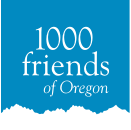By Nicole Johnson and Brett Morgan
Today, 1000 Friends of Oregon will celebrate, reflect, and honor Indigenous Peoples' Day. As a land use organization, we know we have a particular responsibility to reflect on our role in systems of power and oppression. We also have a duty to improve our equity work and outcomes for Indigenous peoples and other marginalized individuals.
But what is Indigenous People’s Day? The Indigenous Peoples' Day Toolkit, an incredible resource created by IllumiNative, a Native-led nonprofit committed to amplifying contemporary Native voices, stories, and issues which advance justice, equity, and social impact, sums it up perfectly:
“Indigenous Peoples’ Day is a holiday celebrated on the second Monday of October in the United States, in lieu of Columbus Day. Indigenous Peoples’ Day, at its core, aims to celebrate and honor the past, present, and futures of Native peoples throughout the United States and acknowledges the legacy of colonialism, which has devastated Indigenous communities historically and continues to negatively impact them today. More importantly, however, Indigenous Peoples’ Day moves beyond the narrative of oppression and honors the histories, cultures, contributions, and resilience of contemporary Native peoples.”
Internally, 1000 Friends knows it has ongoing work to do as an organization to help advance social justice, understand the history of colonization, and support actions of Indigenous sovereignty. While many of the worst injustices in land theft and degradation were not created by Oregon’s land use planning system, established in the 1970s, the system nonetheless inherited the previous 400+ years of injustice. Reflecting on this continues to be a call to action for our organization, for our policy advocacy, and for the coalitions of which we are a part.
We encourage you to learn more about the Indigenous Lands you now live on. You can look this up by going to https://native-land.ca/, or by texting your ZIP code to (907) 312-5085 and an automated program will text you back information about lands you are on.
With this information we encourage folks to research more and reflect on:
-
Who are the indigenous peoples whose land you are on; are there multiple?
-
Can you find more direct information on these peoples from materials they have put out themselves?
-
What was the relationship of these people with their land, and how did colonialism and white terrorism disrupt this? What ongoing forms of power keep these dynamics in play?
-
What are the current community needs of these peoples? How are they asking folks to show up for them? Are there direct community support opportunities?
Thank you all for taking the time to read, learn, and reflect with us today.
Sincerely,
Brett Morgan & Nicole Johnson
Other things we’re reading and reflecting on (a starting point for further education):
-
Native American Activism: 1960s to Present —Zinn Education Project
-
The White Sands discovery only confirms what Indigenous people have said all along
-
Standing Rock Sioux and Dakota Access Pipeline | Teacher Resource
- We Need to Reframe Why We Do Land Acknowledgments
